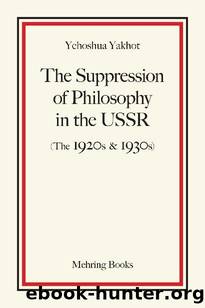The Suppression of Philosophy in the USSR (The 1920s & 1930s) by Yehoshua Yakhot

Author:Yehoshua Yakhot [Yakhot, Yehoshua]
Language: eng
Format: epub
Publisher: Mehring Books
Published: 2013-03-13T00:00:00+00:00
2. Hegel and Marxist Dialectics
On 20 November 1931, Aleksei Stetsky, who then headed the propaganda department of the Central Committee, opened a ceremonial conference dedicated to the hundredth anniversary of Hegelâs death with the following admonition:
âIn their commentaries our enemies will speak of this conference as ânew window-dressing, new flourishes, and a new eccentricity of the Bolsheviks.ââ30
What lay behind such a prognosis? Why did the chief of propaganda suddenly foresee that this topic might elicit what he called âa series of ironical remarksâ from philosophers in Western countries? There were reasons for this view. Only a few months before, the Deborinists had suffered a bitter defeat. And one of the main accusations leveled at them had been the emphasis they placed upon Hegelâs greatness and his significance for Marxist theory. By contrast, the conclusion was inevitably drawn that Hegel was not in favor and that he was one of the reasons for the fall of the acknowledged authorities. But Hegel was too serious a figure for Marxism to renounce his heritage out of hand. It was necessary to put into motion all the resourcefulness of dialectics to create the impression that tradition had been preserved. The above-mentioned ceremonial celebration of the hundredth anniversary of Hegelâs death served precisely this political goal. That is the reason for the sudden reference to the window-dressing, flourishes, and eccentricities of the Bolsheviks: a political, rather than a strictly scientific, goal often does indeed contain âflourishesâ of every type. On this occasion, too, there were more than enough of them.
An assessment of Hegelâs philosophy offers limitless possibilities for dialectical resourcefulness: it is contradictory in its very foundation. On the one hand, Hegelâs philosophy is a source of Marxism that contains within itself the acknowledged ârational kernelâ â dialectics, the doctrine of development. Marx, Engels, and Lenin often took note of this. Following Herzenâs lead, it has more than once been said that Hegelâs philosophy is the âalgebra of revolution.â On the other hand, it is an idealist system which is incompatible with the very same âalgebraâ and with the foundations of the materialist world outlook. As such it is the âgospel of reaction.â Engels often spoke about the contradiction between the method and the system in Hegelian philosophy. For disciples of the struggle on two fronts, the contradictory nature of Hegelian philosophy was an absolute godsend: depending upon the political demands of the moment, it was easy to stress first one, then the other side. And in the struggle which unfolded in 1930â1931, this weapon proved to be simply irreplaceable; the Deborinists could be charged with âover-estimatingâ Hegel, and the mechanists with âunder-estimatingâ him. There was no defense against this âweapon,â for it was wielded not in order to make an all-sided analysis, but to achieve certain specific goals. An analysis of the events of those years will show how justified this conclusion is.
Let us begin by outlining the positions of the Deborinists. In order to understand their attitude towards Hegel, we must remember that they based themselves on what they had learned from their teachers.
Download
This site does not store any files on its server. We only index and link to content provided by other sites. Please contact the content providers to delete copyright contents if any and email us, we'll remove relevant links or contents immediately.
| General | Copenhagen |
Room 212 by Kate Stewart(5105)
The Crown by Robert Lacey(4807)
Endurance: Shackleton's Incredible Voyage by Alfred Lansing(4769)
The Iron Duke by The Iron Duke(4349)
The Rape of Nanking by Iris Chang(4203)
Joan of Arc by Mary Gordon(4101)
Killing England by Bill O'Reilly(3996)
Say Nothing by Patrick Radden Keefe(3975)
I'll Give You the Sun by Jandy Nelson(3429)
Shadow of Night by Deborah Harkness(3361)
Hitler's Monsters by Eric Kurlander(3329)
Mary, Queen of Scots, and the Murder of Lord Darnley by Alison Weir(3204)
Blood and Sand by Alex Von Tunzelmann(3195)
Eleanor & Park by Rainbow Rowell(3153)
Darkest Hour by Anthony McCarten(3119)
Margaret Thatcher: The Autobiography by Thatcher Margaret(3080)
Book of Life by Deborah Harkness(2932)
Red Famine: Stalin's War on Ukraine by Anne Applebaum(2929)
The One Memory of Flora Banks by Emily Barr(2857)
